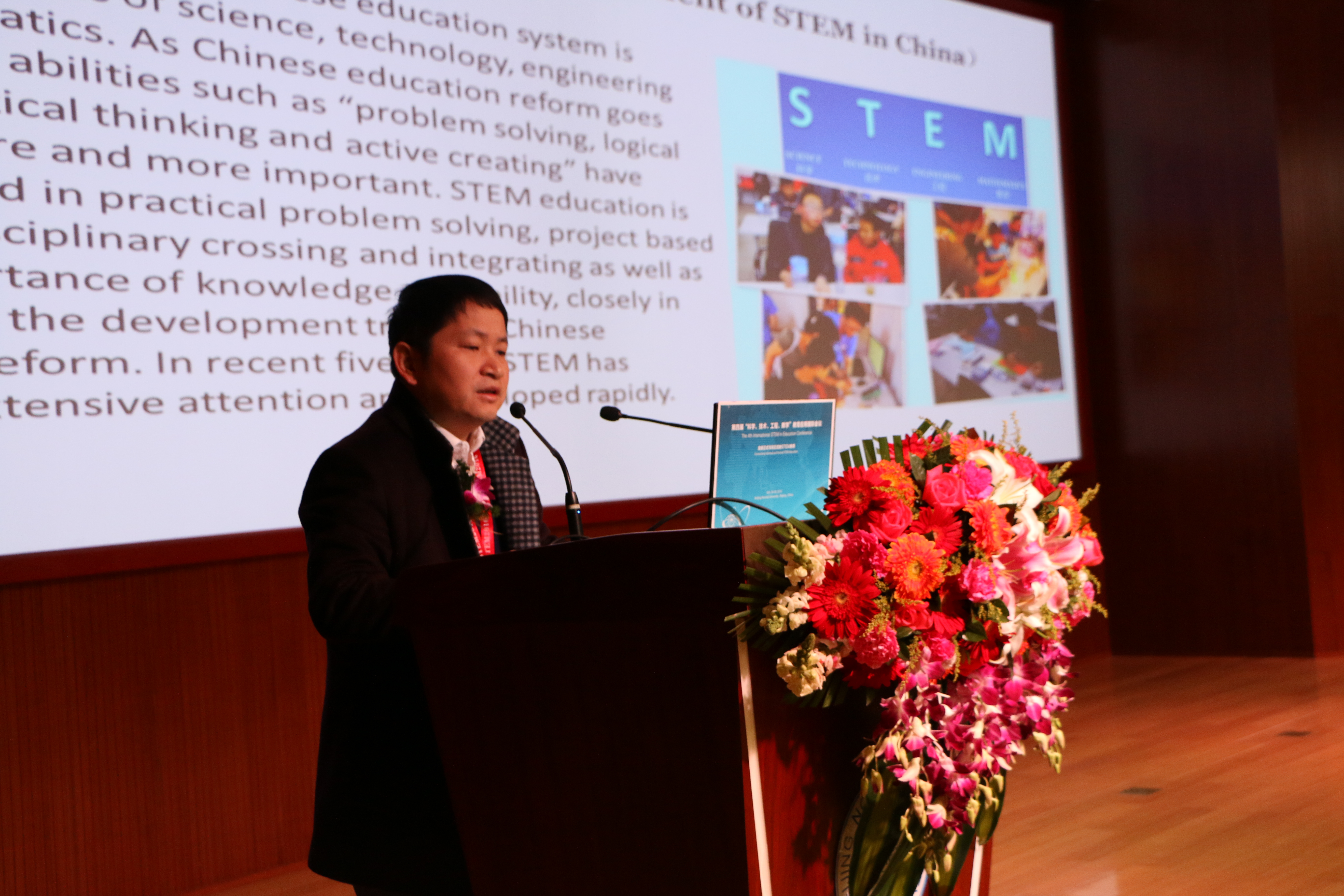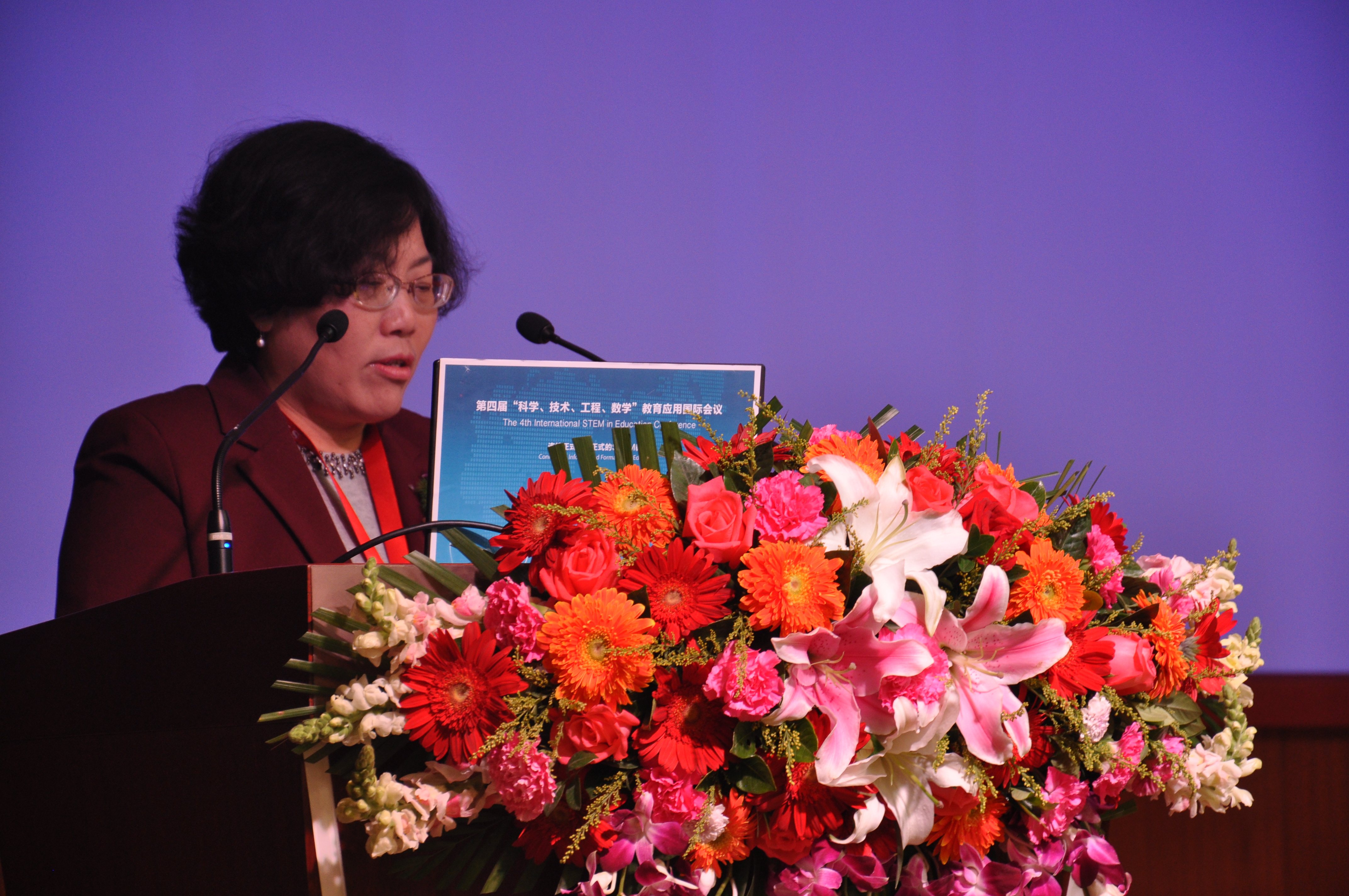STEM 2016: The 4th International STEM in Education Conference
On October 26-28, the 4th International STEM in Education Conference was held successfully at Beijing Normal University (BNU). Collaborating partners of this meeting are BNU; Queensland University of Technology, Australia; The University of British Columbia, Canada; The University of Sydney, Australia; University of Calgary, Canada; Northeast Normal University, China; and Southwest University, China. Organizers are: Faulty of Education, School of Educational Technology, and Beijing Advanced Innovation Center for Future Education (AICFE)BNU. Pearson, Semia, Jiang Feng (Shanghai), and Brilliantedu sponsored the conference. STEM 2016 attracted around 200 attendees from 15 countries world-wide, including college faulty and administrators, researchers, undergraduate and graduate students, and K-12 teachers.
International STEM in Education Conference was initiated by Queensland University of Technology, Australia; BNU, China; and The University of British Columbia, Canada since 2010. Because the importance of Science, Technology, Engineering and Mathematics (STEM) in Education has been emphasized in numerous government policies in Canada, USA, Australia, China and elsewhere. The conference created an opportunity for educators and researchers from schools, universities, businesses, industries and other private and public agencies to share and discuss their innovative practices and research initiatives that may advance STEM education. The theme of STEM 2016 was connecting formal and informal STEM education.
In the opening ceremony, Professor. Li CHEN, the vice president of BNU warmly welcomed all to the conference. Professor Shengquan YU, the chair of the 4th International STEM in Educational Conference, Associate Dean of the Faulty of Education, and Executive Director of AICFE, delivered a speech. Professor Yu addressed that in recent five years, STEM has captured extensive attention and developed rapidly in China. STEM education is characterized in practical problem solving, project based learning, disciplinary crossing and integrating, as well as equal importance of knowledge and ability, which closely in accord with the development trend of Chinese education reform. STEM education is greatly supported by the government policy, academic research, and practical application.
Picture 1: Professor. Li CHEN warmly welcomed all to STEM 2016

Picture 2: Professor Shengquan YU delivered a speech in the opening ceremony
Four keynote speakers of the conference were: Dr. Marcia C. Linn, Dr. Shirley Simon, Dr. Maija Aksela, and Dr. Qian FU. Dr. Linn is a professor of development and cognition specializing in education in mathematics, science, and technology in the Graduate School of Education at the University of California, Berkeley. She is a member of the National Academy of Education and a Fellow of the American Association for the Advancement of Science, the American Psychological Association, and the Association for Psychological Science. She has served as Chair of the AAAS Education Section and as President of the International Society of the Learning Sciences. She directs the NSF-funded Technology-enhanced Learning in Science (TELS) center and the Web-based Inquiry Science Environment (WISE). Her speech was Leveraging Advances in Technology to Improve STEM Teaching and Learning. “Combining innovative technologies with knowledge integration design principles can make STEM teaching learning more motivating, exciting, and effective. She used examples from the WISE to illustrate how insights from learning sciences summarized in the knowledge integration framework can guide design of STEM instruction.
Dr. Simon is Professor of Science Education at the Institute of Education, University of College London. She took a position at the Institute of Education in 2001 and has since been Head of Department. Her speech title was: To Choose STEM or not: what inspires young people to make life choices in STEM? Dr. Simon drew on previous reviews of studies in the field, which influences that impact on subject preferences and career choices are multi-dimensional, and her current research on two STEM education projects to explore the complex issue of subject and career choice in STEM.
The third keynote speaker is Dr. Maija Aksela, Professor and Research Director in the Unit of Chemistry Teacher Education, Department of Chemistry, University of Helsinki. Dr. Aksela is the head of both national LUMA Center Finland and the Unit of Chemistry Teacher Education. The LUMA represents Finnish model to promote math, science and technology education. It aims to inspire and motivate 3-19 years old children and youth into mathematics, science and technology through the latest methods and activities of science and technology education.
Dr. Qian FU is associate professor at School of Educational Technology, Beijing Normal University. He leads the Maker Education Laboratory. He has been working within the implement of educational technology for a long time, especially focusing on researches about Internet of Things in educational practice and Maker Education supporting ecosystem. For carrying out the class effectively, we designed and created Mixly, a graphic software for programming based on the idea of open source and zoology. With the help of Mixly, students can utilize various intelligent terminals to complete the design, development and sharing of creative electronics, and instructors can carry out Maker activities characterized by imitation, integration and collaboration considering the individuality of students, which will promote the popularization of Maker education.
Because research areas of AICFE match with Professor Linn’s specialties, especially on how computer and technology can be used to support learning and teaching. Also match with Professor Simon’s research on how social, psychological and contextual features impact subject preferences and career choices. Therefore, AICFE invited Professor Linn, Professor Simon, and Professor Aksela to visit AICFE and to consult with them about researches and work doing by AICFE. They said that the work and research of AICFE is interesting and exciting and hope could learn more about AICFE in the future.
Picture 3: Keynote Speaker of STEM 2016 visited AICFE



